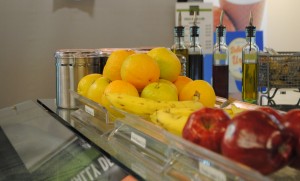Many college students are a victim of the well known “freshman 15” due to a lack of knowledge or discipline when it comes to what and when they should be eating when they finally get out the house and on their own.
Nutritionist Dr. Maria Stewart hosted an hour long nutrition workshop on Monday, Oct. 21, to inform the students of Chaminade University of some of the keys to maintaining a successful diet in many different situations such as values/traditions, preferences, availability/cost, and health.
“When I came into the meeting, I knew that I didn’t have the best diet, but I didn’t realize what that diet could do to my future health,” said Chaminade junior AJ Matthew. “Dr. Stewart really opened my eyes to some simple and effective ways to change my diet without knocking out the bad foods I love.”

Photo by: Lee Bailey
Dr. Stewart started off by explaining that dieting does not mean that once students get to college, they have to become a vegan or stop eating fast food in general because that is unrealistic. The keys to basic healthy diet principles are adequacy, balance, calorie control, moderation, and variety. Having a healthy diet doesn’t mean going vegan or eating all organic foods; it means getting the daily food groups including all the foods you like just in moderation.
“The workshop facilitator proved that the statement you are what you eat is false because water is what we consume most and then there’s proteins and minerals,” said Chaminade graduate Justin Tuiasosopo. “A balanced diet is essential to staying healthy. It was recommended that we eat at least one item from each food group a day.”
The five food groups are grains (6 oz. a day), vegetables (2 ½ cups), fruits (2 cups), dairy (3 cups), and protein (5 ½ oz.).
“The easy way to gauge how big a cup is, is about the size of a balled up fist,” Dr. Stewart said.
She also explained that an ounce is about the size of your palm as an easy way to check how much of each food group that you are eating per serving.
Each serving size and the amount of calories taken in a day can vary due to the size of the person and the amount of physical activity in a day. It is important with more physical activity to still put in more calories and protein than normal because a lack of these can lead to future health issues.
As college students, it is important to pay attention to the environmental and psychological cues around you in order monitor what and how much food you take in. Aroma and visual cues can trigger the brain to feel hunger even when your body doesn’t need it. Students are also so used to multi-tasking that they are less aware of the food intake and that can cause eating more food than needed. Multi-tasking also causes food to get eaten faster and doest give the brain time to register a feeling of satiety (fullness) from our digestive system.

Photo by: Lee Bailey
In college a lot of the dorms do not have full kitchen accessibility some good on the go items to eat are trail mix (yes the M&Ms too), yogurt with granola (Greek yogurt is good for vegans to get protein that don’t like tofu or beans), and the classic peanut butter and jelly sandwich.
“Eat a Veg [vegetable], and take a trail mix were some of the affordable suggestions that were made to help broke college students eat healthy, and that is what I am going to try and do,” said Tuiasosopo. “The workshop reassured that eating fruits/vegetables is a way better option than the McDonald’s dollar menu.”